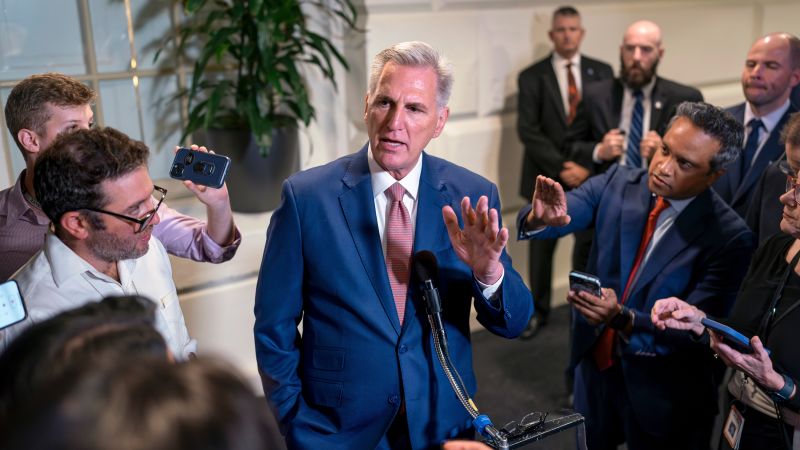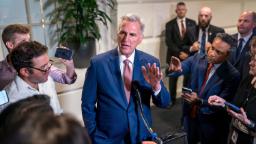

CNN
—
Speaker Kevin McCarthy sent his House members home for the week without a clear plan to avoid a looming government shutdown after hardliners in the Republican conference once again scuttled his spending plans, delivering an embarrassing floor defeat for GOP leadership for the second time this week.
The Republican leader slammed his far-right flank for wanting to “burn the place down,” after conservatives dramatically bucked McCarthy and GOP leadership on a procedural vote over a Pentagon funding bill, throwing the House into total paralysis. And now, members are not set to return to session until Tuesday as the possibility of a shutdown at the end of next week appears ever more likely.
“It’s frustrating in the sense that I don’t understand why anybody votes against bringing the idea and having the debate,” McCarthy told reporters.
Thursday’s failed vote marked yet another blow to McCarthy, who is under pressure and has faced threats of an ouster. The defense funding bill that was derailed typically garners widespread bipartisan support, a sign of how even usually uncontroversial issues have become mired down in Republican infighting.
Days of negotiations have yielded a few apparent breakthroughs, but the speaker’s Republican opponents have been quick to throw cold water on progress and openly defy his calls for unity. McCarthy’s thin margin in the chamber means that in most votes he can only lose four members without any support from Democrats – and absences can raise and lower the majority threshold.
House Republicans had originally planned to be in session over the weekend to pass a stop-gap government funding bill. But that strategy is now on ice amid infighting within the House GOP conference, and House Republican leaders are sending members home for the week amid deep divisions, according to multiple GOP sources.
The new plan, according to multiple lawmakers and aides, is for Republicans to try to complete work on individual, long-term spending bills, since their short-term funding bill did not have the necessary GOP votes amid hardliner opposition.
But there is little chance that work could be finished before next week’s funding expiration deadline. In addition, those bills would be dead on arrival in the Senate, making that not a viable plan to avert a shutdown.
While votes are no longer expected over the weekend, some House lawmakers will remain in Washington to continue discussions over next steps.
Late Wednesday evening, McCarthy briefed his conference behind closed doors on a new potential plan to keep the government open – paired with deeper spending cuts and new border security measures – in an attempt to win over wary members on his right flank.
The plan, as outlined by the speaker, would keep the government open for 30 days at a $1.47 trillion spending level, a commission to address the debt and a border security package. Separately, they also agreed to move year-long funding bills at a $1.53 trillion level. That level is below the bipartisan agreement that the speaker reached with the White House to raise the national debt limit.
It’s not clear whether Republicans would actually be able to unify around the plan – but even if they did, it would be on arrival in the Senate, making it not viable as an option to actually prevent a shutdown.
On Thursday, six Republicans total ended up voting against the rule. Reps. Dan Bishop of North Carolina, Andy Biggs of Arizona, Matt Rosendale of Montana, Eli Crane of Arizona and Marjorie Taylor Greene of Georgia voted against the bill. House Rules Committee Chairman Tom Cole of Oklahoma also eventually changed his vote, casting his vote against the rule so he could bring it back up for reconsideration.
It remains unclear exactly what course of action Congress will take next week as it rapidly approaches the shutdown deadline.
Senate Majority Leader Chuck Schumer, however, took a procedural step on Thursday that would allow the Senate to vote on a short term government funding bill next week.
“As I have said for months, we must work in a bipartisan fashion to keep our government open, avoid a shutdown and avoid inflicting unnecessary pain on the American people. This action will give the Senate the option to do just that,” he said.
This story and headline have been updated with additional development
